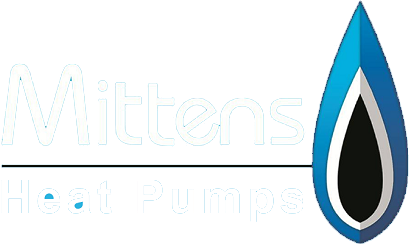Heat Pumps
Table of Contents
- 1 - Why Heat Pumps?
- 2 - How Heat Pumps Work
- 3 - Heat Sources
- 4 - Air Source Heat Pumps
- 5 - Ground Source and Air Source Heat Pumps Compared
- 6 - Heating in Your Property
- 7 - Heat Pump Brands
- 8 - How Much Can Heat Pumps Save you?
- 8.1 - Renewable Heat is Cheaper than Conventional Fuels
- 8.2 - How to Make the Most of the Renewable Heat Incentive (RHI)
- 8.3 - District Heating and Communal Heating
- 8.4 - What’s the Difference Between District Heating and Communal Heating?
- 8.5 - Is Communal Heating Right for my Property?
- 8.6 - Forward Thinking Heating Solutions with District Heating
- 9 - Heat Pump Quotes and Installation
- 10 - Heat Pump Services and Maintenance
Are you looking for a heat pump system for your UK property? The Mittens Heat Pumps UK is a group of experienced heat pump installers and engineers with a special interest in renewable energy.
Our residential and commercial heat pump services, products and solutions are cost-effective and we draw on our wealth of experience and know-how to meet our customers’ specific needs.
Why Heat Pumps?
Installing a heat pump in your property will give you four pounds’ worth of heat for every pound of electricity you invest.
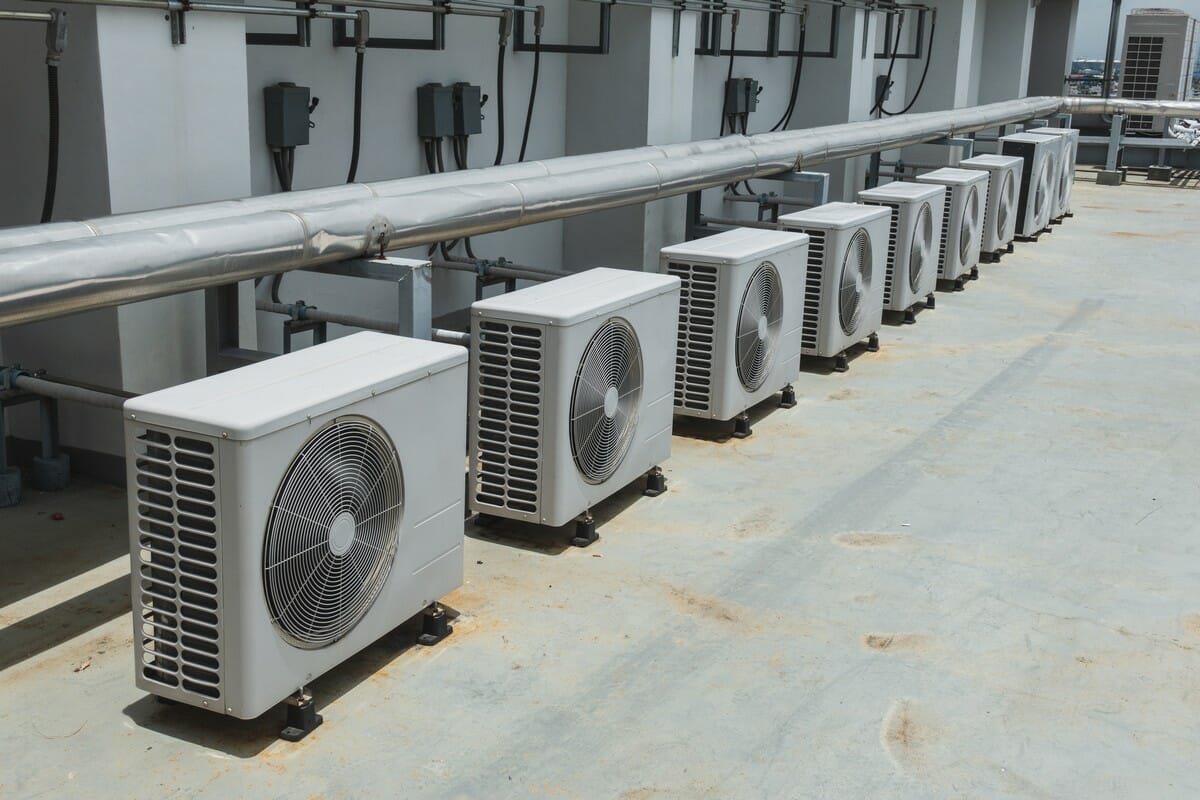
Because the heat pump does not burn any fossil fuel when producing heat, it produces far less greenhouse gas emissions than a conventional furnace. Furthermore, a heat pump eliminates a potential source of carbon monoxide in your home entirely.
Our Guarantee
- Over Six Years Experience
- Unrivaled Experience
- An Exceptional Service
- Unbeatable Value For Money
- Industry-approved Scaffolders
- A Full Range of Heat Pumps Services
- Professional, Reliable and Diligent
- 100% Safety and Satisfaction
How Heat Pumps Work
A heat pump is an electric device that extracts and transfers heat from one place to another by circulating a substance called a refrigerant. To make cool space cooler and warm space warmer, heat pumps move the heat away from space to make it cooler and move warm air into a space to make it warmer.
Heat Sources
Ground Source Heat Pumps
Ground source heat pumps draw heat from the earth to heat your home. They are a powerful technology used for heating and cooling spaces and they are highly efficient and renewable. Compared to other heating systems they are environmentally friendly and have low maintenance once installed.
Air Source Heat Pumps
During the winter season, air-source heat pumps draw heat from the ambient air and exclude outside heat during the cooling season in summer. An air-source heat pump can provide efficient heating and cooling for your house. An air-source heat pump, when properly installed, can provide one-and-a-half to three times more heat energy to a home than the electrical energy it uses.
Solar Assisted Heat Pumps
In an integrated system, a solar-assisted heat pump (SAHP) combines heat pump and solar thermal technologies. Aluminium panels mounted on an exterior wall or roof usually absorb heat. The future energy savings are greater compared to solar thermal systems which are less efficient during winter months.
Ground Source Heat Pumps
A ground source heat pump, also known as a geothermal heat pump (GHP), is a central system that can both heat and cool spaces by transferring heat from the ground or to the ground.
How Ground Source Heat Pumps Work
Ground source heat pumps (GSHPs) extract heat from the ground using a network of pipes laid underground. The heat extracted is absorbed into a fluid and passed into a heat pump which is then circulated in the home to bring the heat to underfloor heating systems, hot water to boilers, radiators, and so on.
Why Ground Source Heat Pumps?
Ground Source Heat Pumps save Money
Compared to direct electric heating, the running cost for a heat pump is low. And compared to oil boilers and gas boilers, they are cheaper and can save you money.
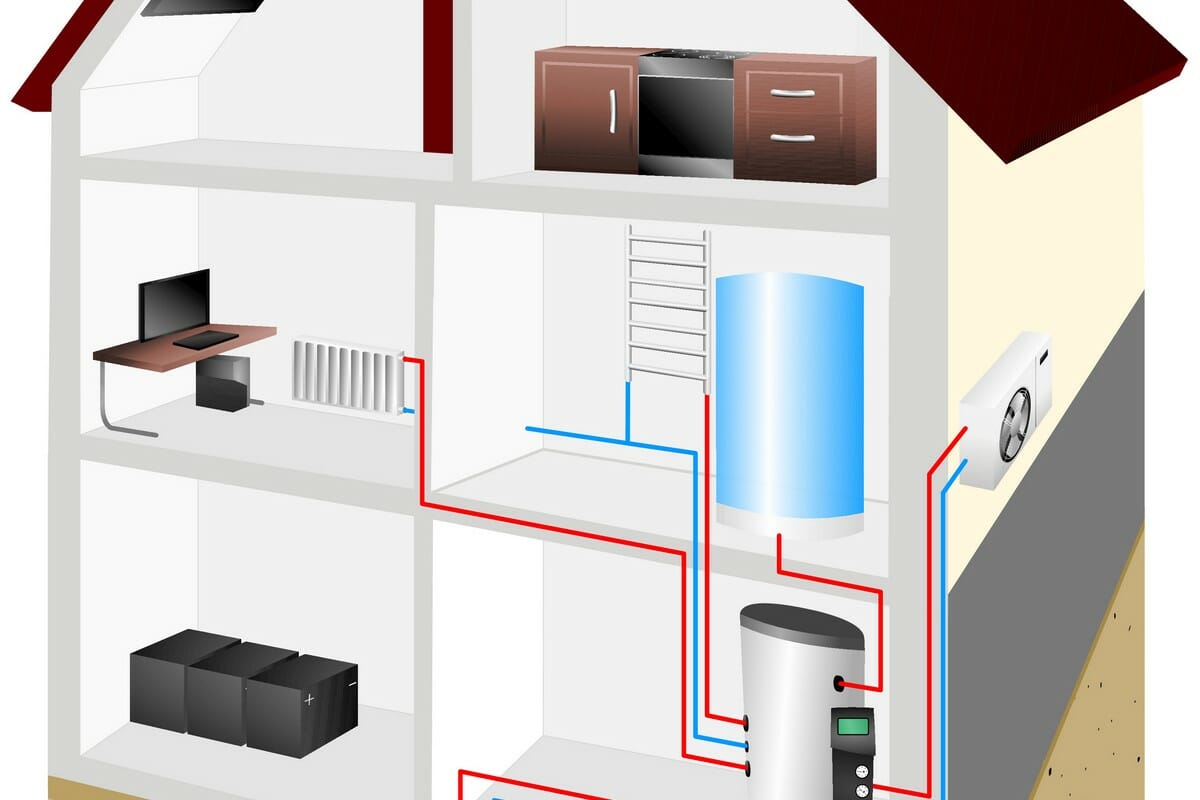
Ground Source Heat Pumps save Carbon Emissions.
Unlike coal, burning oil, biomass or LPG, a heat pump generates no carbon emissions on-site, and no carbon emissions at all, if they are powered by a renewable source of electricity.
Heat Pumps save Space.
Heat pumps don’t require fuel storage. There is no ignition involved and no possible harmful gas emissions. Also, no flues are necessary. Planning authorities like ground source systems, as they are safe, silent, invisible, low environmental impact heating systems. No planning permission required.
Heat Pump Type
How Much Would a Ground Source Heat Pump Save Me?
Because of its low running costs, heat pumps can result in considerable savings compared to conventional heating systems. For example, compared to a new gas boiler, a ground source heat pump can reduce energy bills by at least 26%.
Depending on which system you want to replace, an average ground source heat pump could save you between £500 and £1,400 per annum.
Air Source Heat Pumps
How an Air-Source Heat Pump Works
Air source heat pumps absorb heat from the outside air, heating the fluid in them. This fluid then passes through a compressor which raises its temperature and transfers its higher temperature heat to the house’s heating and hot water circuits.
How Much Could an Air Source Heat Pump Save Me?
Air source heat pumps offer about £400 in annual savings compared to electric resistance heaters and about £800 in annual savings compared to oil furnaces.
Ground Source and Air Source Heat Pumps Compared
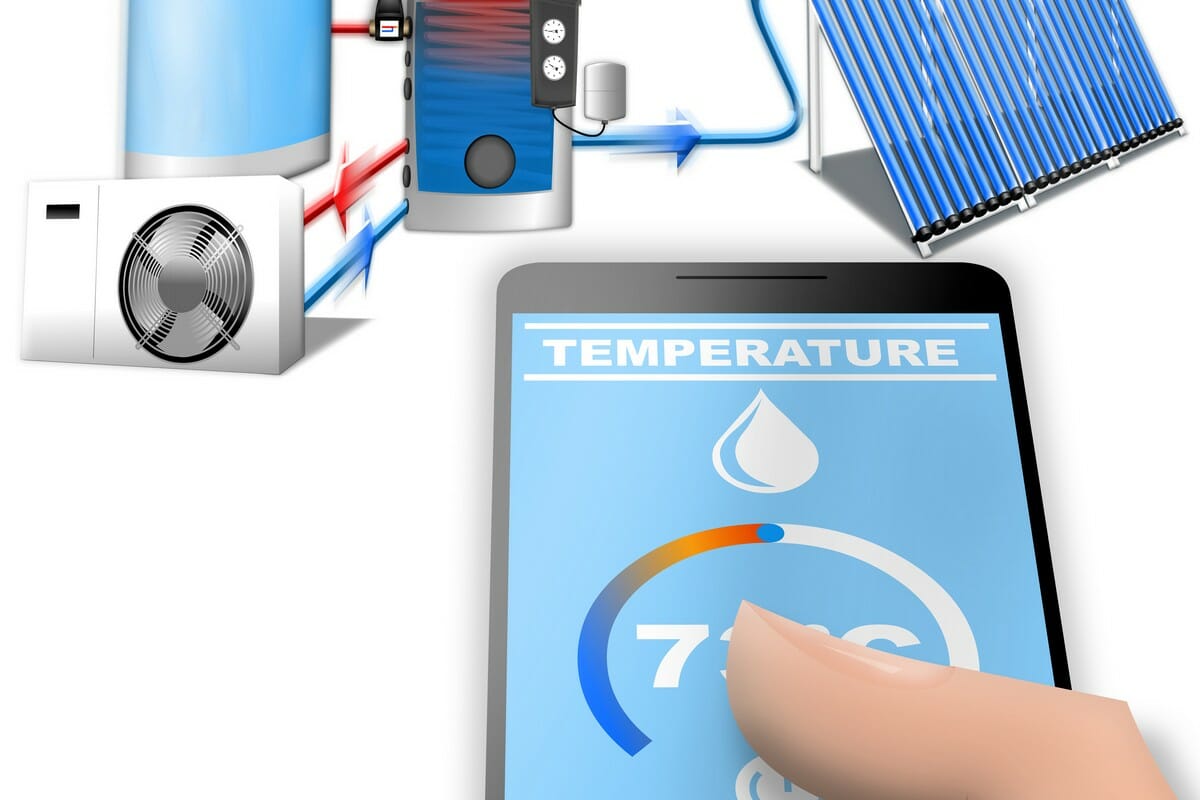
Converting air temperatures can take more energy than converting temperatures at ground level. So ASHPs consume more power than GSHPs.
On the positive side, ASHP systems can cost less upfront and typically provide you with a better return on your investment in more moderate climates. However, when the outdoor temperatures fall, they lose their advantage.
Installing a heat pump with air supply is as simple as hooking up an air conditioner. Your house doesn’t have to fulfil specific standards to apply for a heat pump. Ground source heat pumps require land excavation around your home, and can only be appropriate if you have enough subsoil and a large enough space in your yard.
Once installed, a ground source heat pump can achieve bigger savings on energy bills, particularly if you are replacing an oil boiler. However, both systems can save you money in most situations.
Heating in Your Property
Heating and Cooling via HVAC
HVAC stands for Heating, Ventilating, and Air Conditioning. The heating and cooling systems that you use at home are HVAC systems, too. Our HVAC system is designed to provide thermal control and comfort to the interior of your home. Choose our HVAC system to meet your comfort needs, without relying on extra resources and rising your living costs.
Central Heating and Underfloor Heating
A central heating system provides warmth from one point to multiple rooms over the entire interior of a building. Underfloor heating is one of the most energy effective ways of heating your house. The Mittens Heat Pumps UK provides and installs underfloor heating systems.
Heat Pump Brands
| Amana | American Standard | Bryant |
| Carrier | Coleman | Dimplex |
| Goodman | Hitachi | Lennox |
| Mitsubishi Electric | Rheem | Ruud |
| Samsung | Trane | Worcester Bosch |
| York |
We Are Also Available to Offer Heat Pumps Related Advice
Heat Pump Brands Compared
| Brand | Output capacity | Physical Unit Size | Efficiency Ratings | Average running decibels | Unit Price |
|---|---|---|---|---|---|
| Amana | 52,000 BTU | 35.5 x 35.5 x 41.25 inches | Up to 21 SEER; ENERGY STAR efficient | 74 bB | £2,000 to £3,700 |
| Bryant | 24,000 to 60,000 | 43.81″H x 35″W x 35″D | Up to 20.5 SEER; ENERGY STAR qualified | 58 dB | £3,600 |
| Carrier | Heating: 25,200 to 37,200.
Cooling: 32,800 to 35,200 BTU |
50.19 x 36.13 x 39.25 inches | Up to 20.5 SEER; ENERGY STAR partner | 55 dB | £4,000 |
| Coleman | 60,000 BTU | 46 1/2 x 34 1/2 x 38 1/4 inches | Up to 20 SEER; ENERGY STAR qualified | 54 dB | £1,200 |
| Goodman | Heating: 59,500 BTU/Cooling: 56,500 BTU | 35.5 x 35.5 x 40 inches | ENERGY STAR certified; up to 19 SEER |
75 dB |
£3,200 |
| Lennox | 60,500 BTU | 47 x 39.5 x 35.5 inches | Up to 23.5 SEER;ENERGY STAR qualified | 64 to 74 dB | £4,400 |
| Rheem | 60,500 BTUs | 35.75 x 51 x 35.75 inches | Up to 20 SEER; ENERGY STAR qualified | 59 dB | Around £1,800 |
| Ruud | 60,500 BTUs | 51.17 x 36.13 x 36.13 inches | Up to 20 SEER and 11 HSPF; ENERGY STAR qualified | 59 dB | £2,500 to £5,600 |
| Trane | 60,000 BTUs | 54 x 37 x 34 inches | Rated Most Efficient 2019 by ENERGY STAR; Up to 20 SEER | 43 dB | £2,600 |
| York | 2 to 5 tons | 46 1/2 X 35 1/2 X 34 1/2 inches | Up to 20 SEER; ENERGY STAR qualified | 35 dB | £2,000 |
How Much Can Heat Pumps Save you?
If you have oil-fired heating currently, the Energy Savings Trust says you could save between £475 and £735 a year. If your home has electric heating, the savings are much higher for the whole year ranging from £830 to £1465. Finally, if your home has gas heating, then by having a heat pump installed the savings are between £1315 and £1975 annually.
Renewable Heat is Cheaper than Conventional Fuels
The energy produced by renewables these days is just as affordable as, if not cheaper in some cases than the energy produced by fossil fuels. Any solar panel schemes can also produce electricity at about half the cost of fossil fuels such as coal. That is a lot of potential savings.
How to Make the Most of the Renewable Heat Incentive (RHI)
The Domestic RHI provides financial incentives to domestic property owners who install renewable heating technologies on their premises, such as ground source heat pumps and solar thermal.
The RHI scheme is administered by the energy regulator Ofgem. The application form can be found on their website.
To fill in the domestic RHI application form you will need:
- Your Microgeneration Certification Scheme (MCS) open key term certificate number.
- Your Energy Performance Certificate open key term number.
- Your bank details so Ofgem will be able to pay you.
Make sure the name you have on your bank account is the same as the one you use to fill the application.
The scheme remains open to applications until March 31, 2022, and you can apply through the Ofgem website.
We Are Also Available to Offer Heat Pumps Related Advice
District Heating and Communal Heating
District Heating, also known as heat networks or teleheating, this is a system for the distribution of the heat generated in a centralised location by means of insulated pipes for residential and commercial heating requirements such as space heating and water heating.
Communal Heating supplies heat from a common heat source or boiler to a number of dwellings. It may consist, for example, of a system that heats a block of flats, or of a larger system that heats many buildings. This eliminates the requirement for individual boilers and supply of gas within each home.
What’s the Difference Between District Heating and Communal Heating?
Community heating is a centralised heating system with more than one heat customer providing heat and hot water to one building block. A district heating system, on the other hand, is a large-scale generation of heat distribution, usually found in towns.
Is Communal Heating Right for my Property?
If you have a property of 50 apartments and above, a communal heating network is right for you. In fact, a communal heating system can be used anywhere from a small domestic environment (i.e. a house) to a network of big business premises and the public sector, such as a hospital. Leisure centres, schools, offices, jails, and large residential projects can benefit from a communal heating system, too.
Forward Thinking Heating Solutions with District Heating
District heating is a hot idea whose time has come. It offers cleaner central heating with obvious health and air quality benefits, fuel savings, space savings and less smog. More than 50% of the UK’s actual, usable energy demand comes from building heating and cooling use. Installing district heating in towns and communities helps increase their energy quality, contributing to energy savings and reducing the cost to their residents.
Heat Pump Quotes and Installation
Contact us for a Personalised Quote
If a heat pump system sounds interesting to you but you are overwhelmed by the options, we will be happy to assist you. Describe in our form what you require for the product. You’ll receive a quote tailored to your specific needs. Our quote is free and without obligation.
Quick and Convenient Installation
Our heat pump systems are designed and installed according to the highest standards and delivered on time. We understand what it takes to make the customer happy and we take pride in the satisfaction of our customers. We’ll be respectful, professional, and supportive.
What Size of Heat Pump do I need for my Property?
When determining the size of the heat pump you need there are two main factors:
- The square footage of the heat pump you want to install.
- Large hallways or doorways linked to that area or room.
Heat pumps vary in size but between 4 kW and 16 kW is okay for the average home. Generally, the larger your home, the greater the output of the heat pump should be.
Recommended Ranges for our Heat Pumps
The optimum temperature range for heat pumps should be 25-30 degrees Fahrenheit.
Try our Calculator for Heat Pumps Based on the Size of Your Property
Selecting the correct size heat pump is crucial to achieving maximum comfort and heating in your home or commercial space.
Space is as distinct and as unique as its occupants and the first step is to pick the right heat pump for your space and venue. Use our heat pump calculator to take the guesswork out of it or book your free in-home consultation and get started now.
We Are Also Available to Offer Heat Pumps Related Advice
Heat Pump Services and Maintenance
To carry out an annual maintenance inspection and service, we offer a simple yet comprehensive service program whereby we will replace filters, optimise the system to suit individual requirements and prioritise a full safety check.
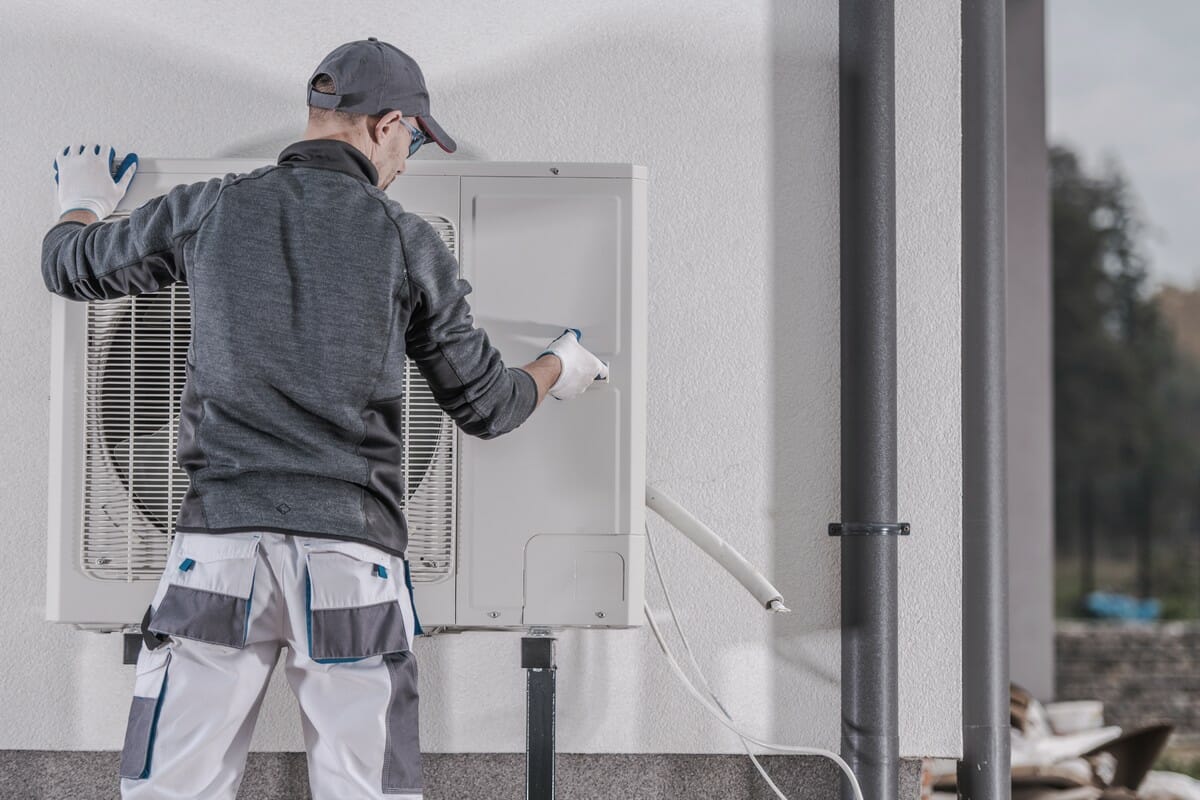
How to Best Look After Your Heat Pump
- Snow or ice that accumulates on the heat pump needs to be removed during the winter. If a normal thaw or simple brushing isn’t enough, you’ll want to switch off your unit and let it power down completely.
- Keep the unit clear of snow, ice, and debris outdoors. This includes the top, sides, bottom and the heat pump around it.
- Do not pick or knock the ice off the heat pump coils using any sharp objects. This could result in a serious personal injury.
- Check your air filters on a monthly basis. Based on their condition, clean or replace them.
- Keep the coils clean on the outside. You can use a heavy-duty degreaser if they get dirty and then just hose them down. Ensure you switch the unit off first.
- We recommend you have your heat pump inspected at least once a year by a trained service technician.
How we can Help With Heat Pump Problems
Our highly trained, committed engineers are available in the UK for installation and maintenance of most forms of domestic heat pumps. We offer ground and air source heat pumps maintenance and repairs as well as heat recovery units.
Our Heat Pump Maintenance Services
Whether you need advice on a heat pump, a repair or a service please call us at 01273257407 or contact us today via our website.
Get in Touch With us for Your Heat Pump Hire Quotes
